Roger Federer: Based on NeemTime research
Biography / Personal Details / Who is Roger Federer
Roger Federer is a Swiss former professional tennis player, widely regarded as one of the greatest players in the history of the sport.
He was born on August 8, 1981, in Basel, Switzerland, and holds dual Swiss and South African citizenship through his mother.
Federer turned professional in 1998 and quickly gained international attention for his elegant playing style and powerful one-handed backhand.
Over his two-decade career, Federer won 20 Grand Slam singles titles, including a record eight Wimbledon titles.
He was ranked world No. 1 by the ATP for a total of 310 weeks, including 237 consecutive weeks, which remains a record.
Off the court, Federer is known for his philanthropy, founding the Roger Federer Foundation to support educational projects in Africa and Switzerland.
His calm demeanor, sportsmanship, and ambassadorial qualities have earned him admiration beyond the world of tennis.
Federer retired from professional tennis in 2022 after a final appearance in the Laver Cup, ending a celebrated era in the sport.
He speaks several languages, including German, French, and English, and is often praised for his articulate and thoughtful interviews.
Federer’s influence extends into fashion and business, with collaborations in luxury clothing, footwear, and watch brands.
Background / Childhood / Early Life Highlights of Roger Federer
Roger grew up in the suburban municipality of Münchenstein, near Basel, where he started playing tennis at a young age.
His father, Robert Federer, is Swiss-German, and his mother, Lynette, is South African, contributing to his multilingual upbringing.
Federer showed early interest in multiple sports, including soccer and basketball, but focused seriously on tennis by the age of 8.
As a teenager, he attended the Swiss National Tennis Center in Écublens and soon dominated the junior circuit.
He won the Wimbledon junior title in 1998, a victory that marked his transition from a promising junior to a professional.
Federer dealt with emotional volatility in his early years, often smashing racquets, which he later overcame through intense self-discipline.
He idolized tennis legend Pete Sampras and even defeated him at Wimbledon in 2001, a symbolic moment of generational shift.
His parents were highly supportive but emphasized education and humility alongside his tennis ambitions.
Roger briefly served as a ball boy at Basel tournaments, foreshadowing his future dominance in the sport.
He trained under renowned coaches including Peter Carter, who had a major influence on his technique and attitude until Carter’s tragic passing.
Career / Other Work / Current Life Highlights of Roger Federer
Roger Federer’s professional career spanned from 1998 to 2022, during which he won 103 ATP singles titles, the second-most in history.
He became the first man to win 20 Grand Slam singles titles, paving the way for an era of dominance alongside Nadal and Djokovic.
Federer was instrumental in popularizing the Laver Cup, a team tennis competition he helped conceptualize and promote globally.
After retiring, he shifted focus to philanthropic and business ventures, including expanding the work of the Roger Federer Foundation.
Federer partnered with the Swiss shoe brand On, contributing to both design and global promotion, and became a significant investor.
In 2023, he appeared in documentaries and commercials reflecting on his career and legacy, often featuring former rivals and teammates.
Federer is frequently involved in exhibitions, charity matches, and high-profile tennis events as a global ambassador for the sport.
He maintains close ties with organizations like UNICEF and is often involved in fundraising efforts for global health and education.
Roger’s current life balances family time, travel, and professional speaking engagements across Europe and the U.S.
He has expressed interest in mentoring younger players, though not taking on a formal coaching role as of now.
Dating History / Family Members / Personal Life of Roger Federer
Roger Federer is married to Mirka Federer (née Vavrinec), a former WTA player whom he met during the 2000 Sydney Olympics.
The couple married in 2009 in a private ceremony in Basel, Switzerland, and they are known for maintaining a low-key personal life.
Roger and Mirka have two sets of twins—twin girls Myla and Charlene born in 2009, and twin boys Leo and Lenny born in 2014.
His family frequently traveled with him on tour, and Mirka has been a constant presence in the player’s box throughout his career.
Federer values privacy deeply and rarely shares personal details publicly, choosing instead to let his professional work speak for itself.
He maintains a strong bond with his parents and sister, who have been integral to his emotional and logistical support system.
Mirka retired from tennis due to injury and has since played a significant role in managing Roger’s off-court commitments.
The Federer family resides in a luxurious lakeside home near Lake Zurich, where Roger enjoys skiing, hiking, and quiet family life.
Despite global fame, Roger is known for his humility and personal warmth, which extend to his family relationships.
He frequently credits Mirka for helping him stay grounded and supporting his tennis journey through its intense highs and lows.
Roger Federer Shirtless
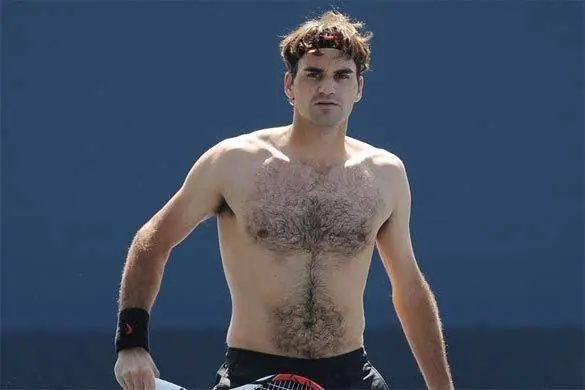
Roger Federer Shirtless 5
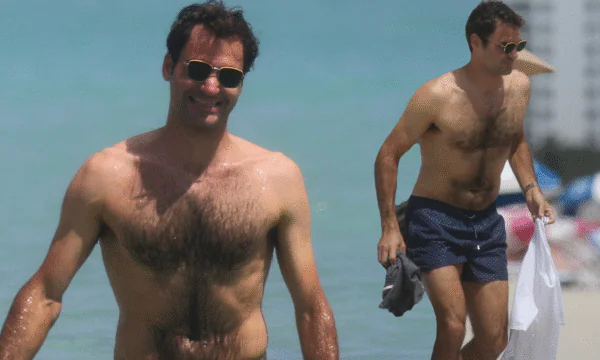
Roger Federer Shirtless 4
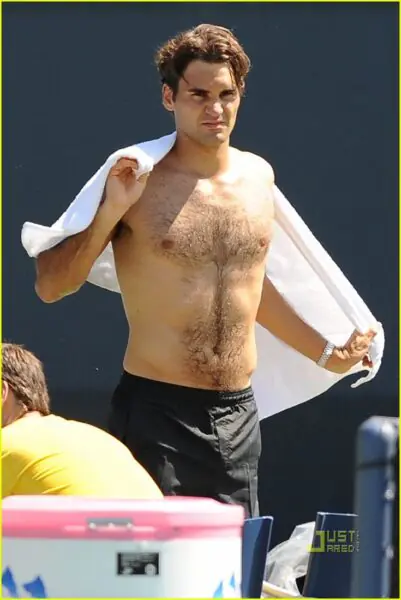
Roger Federer Shirtless 3
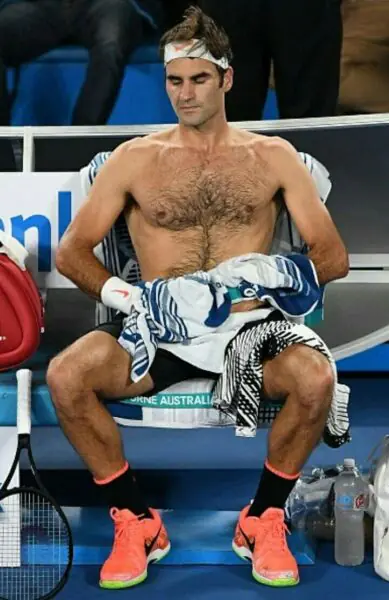
Roger Federer Shirtless 2
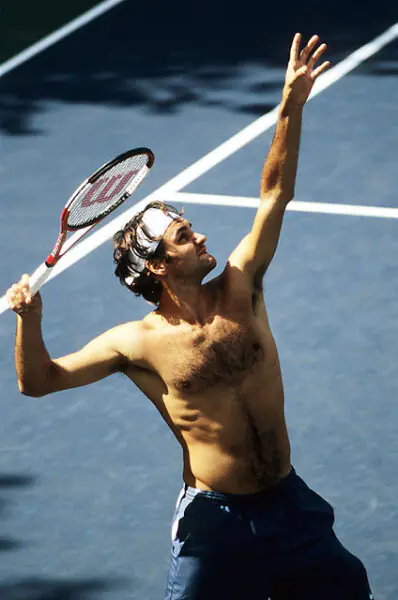
Roger Federer Shirtless
Height / How to Get Body Like Roger Federer
Roger Federer stands at 6 feet 1 inch (185 cm), a height that contributes to his balanced agility and powerful court coverage.
His physique is lean and athletic, built more for endurance, flexibility, and speed rather than bulky muscle mass.
Federer’s training emphasizes a mix of cardiovascular fitness, agility drills, and strength training focused on core and lower body.
He incorporates yoga and stretching routines regularly to maintain flexibility and prevent injuries throughout his long career.
Diet-wise, Federer follows a balanced regimen rich in lean proteins, whole grains, and plenty of hydration to sustain energy during matches.
His workout includes on-court tennis drills that enhance footwork and reaction time, essential for his fluid playing style.
Federer often works with trainers who tailor his workouts to avoid overloading joints and muscles, prioritizing longevity in the sport.
Recovery techniques such as ice baths, massages, and physiotherapy are key parts of his fitness maintenance to keep him match-ready.
Mental conditioning and focus exercises complement his physical training, helping him maintain composure and resilience during pressure situations.
To emulate Federer’s body, it is crucial to combine athletic endurance, functional strength, flexibility, and smart recovery practices rather than just lifting heavy weights.
Interview Quotes of Roger Federer (Where/When)
In a 2017 interview with the BBC, Federer said, “I always believe if you’re stuck in a hole and maybe things aren’t going well you will come out stronger.”
During a 2019 Wimbledon press conference, he remarked, “The key to success is consistency and never giving up on your dreams.”
In an interview with ESPN in 2021, Federer reflected, “Every match I play, I try to enjoy it, because I know it doesn’t last forever.”
Federer told CNBC in 2018, “The pressure is always there, but I have learned to channel it into motivation and not fear.”
In a 2020 interview with GQ, he shared, “I’m grateful for the career I’ve had and the people who supported me along the way.”
During the 2018 Australian Open, Federer said, “You have to be able to adapt and change your game depending on your opponent.”
Federer revealed in a 2016 interview with The Guardian, “Discipline and passion are what keep me going day after day.”
In a 2022 retirement announcement interview, he stated, “It’s a chapter closing, but the love for tennis will never fade.”
At the 2014 US Open, Federer said, “Focus on what you can control, and let go of the rest.”
In a 2015 interview with Vanity Fair, he described his competitive mindset: “It’s about playing your best when it counts the most.”
TV / Movie Quotes of Roger Federer (Where/When)
In the 2020 documentary Roger Federer: The Journey, he said, “Tennis has taught me patience, resilience, and the importance of hard work.”
During his guest appearance on the TV show Comedians in Cars Getting Coffee in 2019, Federer joked, “Sometimes I just want to hit a ball and not think about rankings.”
In the documentary Being Roger Federer (2018), he reflected, “Winning isn’t everything, but it sure feels good when you work for it.”
On The Ellen DeGeneres Show in 2017, Federer shared, “I’m still a kid at heart; I love to have fun on and off the court.”
In SportsCentury: Roger Federer (2007), he said, “Every loss taught me something I could use to become better.”
Federer appeared in a Nike ad campaign in 2016 where he stated, “The game is more than just hitting balls—it’s about creativity and style.”
In the Netflix series Break Point (2023), Federer commented, “Pressure is part of the game; learning to handle it separates the best from the rest.”
During a promotional interview for The Match (2021), he mentioned, “Competing against legends is a privilege and a challenge.”
In the documentary Strokes of Genius (2018), Federer stated, “It’s about pushing your limits and knowing when to trust yourself.”
On The Tonight Show with Jimmy Fallon (2018), Federer quipped, “I still get butterflies before a big match, no matter how many I’ve played.”
Controversies / Gossip / Scandals of Roger Federer
Despite a largely scandal-free career, Federer faced criticism early on for occasionally showing frustration on court, such as racquet smashing, which he later curbed.
In 2015, there was a minor controversy when Federer skipped the ATP World Tour Finals due to injury, disappointing fans and sponsors.
Federer has been scrutinized for his silence or neutrality during some political issues in Switzerland and globally, which some interpreted as aloofness.
Rumors occasionally swirl about his relationship with fellow tennis stars, but Federer has maintained professionalism and respect in all interactions.
In 2018, Federer was questioned about his endorsement deals, particularly with luxury brands, prompting debates about athletes and commercialism.
Some critics debated whether Federer’s privileged upbringing gave him an advantage in tennis compared to players from less affluent backgrounds.
Federer was once fined by the ATP for code violations related to coaching during matches, sparking discussions on rules enforcement.
There was gossip in 2020 about his retirement plans causing tension within the tennis circuit, but Federer publicly denied any internal conflicts.
Occasionally, Federer’s dominant presence in men’s tennis has sparked debates about the sport’s competitive balance, but these are more sports discussions than personal controversies.
Overall, Federer’s public image remains largely positive, with no major scandals or gossip that have significantly damaged his reputation.
Lesser Known Unknown Facts Trivia of Roger Federer
Roger Federer is fluent in Swiss German, English, and French, often switching languages during interviews depending on the audience.
He has a deep passion for football and supports FC Basel, often attending matches when he is off the tennis court.
Federer once worked as a ball boy at a Swiss Indoors tournament in Basel, the same event where he later won multiple titles.
Despite his calm and composed public image, Federer admitted in interviews that he used to struggle with anger issues early in his career.
He has a strong interest in art and owns a notable collection, often visiting galleries and museums during his travels.
Federer is one of the few tennis players to have won the Olympic gold medal in doubles, achieving this feat with Stan Wawrinka in 2008.
His favorite tennis surface is grass, which complements his playing style and helped him win eight Wimbledon titles.
Federer has a unique practice routine where he sometimes uses a smaller racquet to improve precision and control.
He is known for his sportsmanship, having won the Stefan Edberg Sportsmanship Award a record 13 times.
Federer’s parents originally wanted him to focus on academics, but they supported his tennis dreams fully after seeing his dedication and success.
10 Most Commonly Frequently Discussed Questions/Topics with Answers on Roger Federer
Why is Roger Federer considered one of the greatest tennis players of all time?
Fans highlight his record 20 Grand Slam titles, elegant playing style, longevity, and sportsmanship as key reasons.
What makes Federer’s playing style unique?
Users often mention his one-handed backhand, fluid footwork, and ability to adapt his game to all surfaces.
How did Federer maintain his fitness and performance for so long?
Many point to his disciplined training, focus on flexibility, injury prevention, and mental resilience.
What are Federer’s biggest rivalries?
His matches against Rafael Nadal and Novak Djokovic are frequently discussed as defining moments of modern tennis.
How did Federer’s personality contribute to his popularity?
Fans admire his humility, graciousness in victory or defeat, and dedication to charity work.
What’s the significance of Federer’s foundation?
His foundation supports education in Africa and Switzerland, and users praise its impact beyond tennis.
Did Federer have any significant injuries?
Yes, users talk about his knee and back problems, especially later in his career, and how he managed to come back strong.
What are some memorable Federer matches?
Matches like the 2008 Wimbledon final against Nadal and 2017 Australian Open final against Nadal are frequently mentioned.
How did Federer handle pressure in big tournaments?
Fans emphasize his mental toughness and ability to stay calm under pressure as critical to his success.
What is Federer’s legacy beyond tennis?
Many discuss his role as a global ambassador for tennis, his contributions to sportsmanship, and influence on younger players.